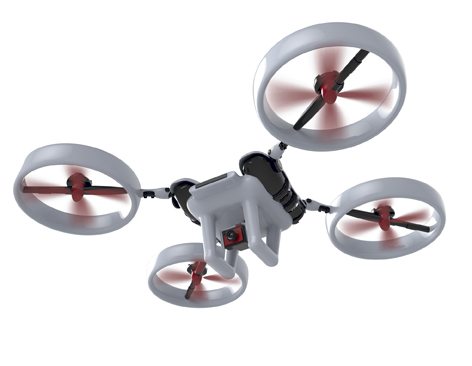Specialty Lines Markets
INSURING SECURITY SERVICES
Coverage needs to keep pace with evolving capabilities
There are roughly 8,000 firms employing about 810,000 people to provide private security services in the United States, but that industry is essentially split into two distinct segments.
One group, amounting to 281 companies, accounts for $22 billion of the estimated $25.5 billion in current revenue, according to the 2018 U.S. Contract Security Industry white paper published by Robert H. Perry & Associates, Inc., a leading consultancy in the security field.
These security firms are transforming themselves by incorporating advanced technologies and cyber-security capabilities, and are adopting labels such as “security solutions,” “security technology,” and “integrated guarding” to describe their increasingly technological role.
“Many contract security companies today that are actually growing are doing so by offering systems integration, integrated guarding, or some other type of electronic security enhancing services,” the report reads.
The remaining 7,719 companies account for only a small fraction of industry revenue and continue to focus primarily on providing traditional security guard service.
Reacting to the previous (2017) Perry white paper, security industry consultant Jack Goldsborough observed that “[security] companies with $50 million or more in annual revenues have grown $5.6 billion or 43% during this [five-year] period, while companies under $50 million have shrunk $1.1 billion or 17%.
“Despite its low barriers to entry and nominal capital requirements, the security guard business has become more challenging for the smaller owner/operator,” Goldsborough added. “The traditionally historic advantage of the smaller operator’s ability to offer relationship-driven customized services is no longer totally sufficient for sustainable growth.”
First Security, a private security guard and patrol vehicle firm that operates in northern California, reports that “you can expect more private security guards to be trained in cyber security and have various IT skills … so they will be able to prevent cyber theft and understand how to utilize the advanced security software that is becoming commonplace.”
Technology focus
The insurance industry has necessarily taken notice of the increased technological focus of security threats and the firms that protect against them.
El Dorado Insurance Services, an agency that serves the security sector, predicts that recruitment and retention of IT professionals will be the leading trend in the security business in coming years. “The security industry will be charged with protecting everything from shopping malls to Dropbox servers, keeping out foreign hackers, domestic enemies and those who would launch small-scale attacks in public places,” the agency says.
Karen Izzo, president of Izzo Insurance Services, an agency that has long served the security sector, observes that “the combination of physical security guards integrated with electronic security and sensor devices is fast becoming the norm.”
Reflecting on a suit filed on behalf of the people killed and wounded at an August 2018 gaming event in Jacksonville, Florida, Izzo comments that the plaintiffs’ attorneys are arguing that “this is not a time for bare-bones security—or worse, no security at all. They say that ‘business as usual’ on the security front will no longer be tolerated and that it is time for business owners and event organizers to step up their game.”

—Tory Brownyard
President
Brownyard Group
Among the most visible applications of advanced security technology is the growing use of aerial drones.
“We are seeing an increase in requests for guard and investigative firms that are using drones,” says Tory Brownyard, president of the Brownyard Group, a program administrator that specializes in liability insurance for security professionals.
“Drones are being used to monitor locations in remote areas and provide surveillance,” he says. “Assuming the personnel using them are properly trained, this is an exposure we are generally able to accommodate for a minimal charge.”
Shootings
Mass shootings are perhaps the biggest driver of increased demand for security services today and the resulting demand for insurance coverage.
“The insurance market for the security industry is hardening, with the major concern being potential claims from active shooter incidents,” says Brownyard. “In many situations, security guards are the first line of defense against an active shooter. This has raised concern among insurers.
“Security firms serving clients with high public exposure are finding the market to be limited,” he adds. “If they are able to find an insurer, they are facing increased rates.”
School shootings, in particular, have led to a growing chorus of calls for armed guards, according to Brownyard. “Unfortunately, most of the markets we see are not willing to entertain security at schools, and the market for armed guards at schools is extremely limited,” he says.
“We tend to shy away from exposures for armed guards except in cases where the guards are well screened and highly trained—preferably retired or off-duty law enforcement officers—and the public exposure is minimal.”
The liability risks associated with armed guards are driving innovations in the development and use of non-lethal weapons, such as pepper sprays that can shoot farther with greater accuracy than in the past, according to Perry & Associates’ latest white paper.
Steady demand
Perry & Associates and other observers note that growing use of electronic security methods will not necessarily result in a reduction in demand for security guards.
“The security guard industry is expected to grow as [its] services are requested for more locations and events,” writes Dominique Gauthier in a report titled Security Guard Industry: Current Trends, Innovations and Challenges. “Assessing potential security risks and taking steps to mitigate them has become a top priority when planning an event or opening a new facility, rather than just an afterthought.”
Given that, Gauthier concludes that “the rising developments in security-oriented technology, as well as an increased demand for security services in general, present significant growth opportunities to companies large and small.”
Among other things, many municipalities, public agencies, and private companies are looking to cut fixed costs by replacing in-house security programs with programs run by contract security companies. Among the biggest developments in this regard is the outsourcing of airport screening services, now carried out by private contractors in 20 U.S. airports, including San Francisco’s.
All of this growth translates into opportunities for insurers.
“I’ve specialized in coverage for the security industry for almost 40 years, and I have never seen the security guard and alarm growth we are currently experiencing,” says Izzo. As one indication of that, “estimated payrolls for renewal policies are increasing by double digits, if not 100% or more.”

—Karen Izzo
President
Izzo Insurance Services
Watch renewals
“Insurance carriers are more cognizant of liability exposures for large special events and are requesting additional underwriting information to identify the exposures,” Izzo adds. “Some security firms are seeking increased limits because of their increased exposure to claims from multiple parties at a single event. For others, increased limits are being required by their clients.
“In spite of the increasing threats,” Izzo adds, “we see rates remaining relatively stable for companies with good management screening, training, loss history, and a roster of clients with lower risk profiles.”
Izzo cautions agents to carefully review policies at renewal time for added restrictions and exclusions.
“It is critical for agents to read every provision in renewal proposals and not assume coverage will remain as it is upon expiration,” she says. “Most carriers are excluding coverage for drones, and some are adding exclusions for large special events, schools, and potential terrorism targets.”
Brownyard echoes that advice.
“Some programs for security firms contain exclusions for certain types of clients, such as schools, low-income housing, or special events,” he says. “It’s important for the broker to make sure the client is not picking up clients they have no coverage for.
“Also, if an insured takes on clients that carriers regard as high risk, such as armed guards at schools and concerts, the insured may be in for a surprise when it finds the insurance company unwilling to renew, or willing to renew only at a significantly higher rate.
“Finally, it is very important for the broker to caution the guard firm about assuming contractual liability,” Brownyard says. “A security firm’s clients will often look to the guard firm to indemnify them for the client’s own negligence. It’s tempting to agree to this, but in the event of a claim, the security firm will usually not be covered.”
For more information:
Brownyard Group
www.brownyard.com
El Dorado Insurance Services
www.eldoradoinsurance.com
Izzo Insurance Services
www.izzoinsurance.com
The author
Joseph S. Harrington, CPCU, is an independent business writer specializing in property and casualty insurance coverages and operations. For 21 years, Joe was the communications director for the American Association of Insurance Services (AAIS), a P-C advisory organization. Prior to that, Joe worked in journalism and as a reporter and editor in financial services.





